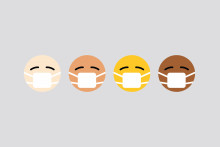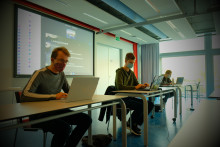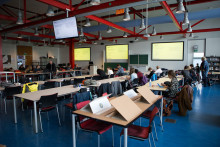Christina Bode is a health psychologist and associate professor at the department of Psychology, Health and Technology at the UT. Shortly after the coronavirus outbreak in the Netherlands, she ‘recognized that corona information for adolescents does not fit the needs and mindset of this age group’.
She advises to share the information via channels most frequented by the younger generation: social media such as Instagram, Reddit, Whatsapp, Snapchat, YouTube, Tiktok and so on. She also suggests to use influencers and other known young people to spread the message.

Christina Bode
New guidelines needed
‘I teach my students that age always needs to be taken into account when you are communicating or designing interventions. You need to connect to the perspective of the people you are working with,’ says Bode. ‘Then I looked at the coronavirus information out there and saw that it was not suited to the mindset of young people. The messages targeted at them basically say “you will not get sick or you will have mild symptoms”. That is not necessarily true and it will not make them committed to the needed behavior change.’
Out of her initiative, the scientist decided to do something about this. ‘I emailed the mayor of Enschede and asked him if we could do better. The next day I started a survey and got 70 responses within two days. The participants were young people aged between 14 and 25, parents, as well as people who work a lot with young adults.’ Based on the survey and scientific knowledge from health psychology and developmental psychology, Bode formulated advice for communicating corona to young people.
‘Young people are not visible’
According to Bode, the public information is largely focused on risks for the sick and the elderly. ‘Young people are not visible in the media if it comes to corona,’ she says. ‘It seems like all the patients are very old. Nowhere can you see how it impacts young people, how it impacts their life if their parents or grandparents are ill. Furthermore, young people trust their peers more than older generation, so it’s important that they are represented in media.’
‘The communication should not be mainly based on fear’
Besides that, the scientist believes there should be more examples of positive solutions. ‘Especially young people need to see how to solve the situation, how to do well. The communication should not be mainly based on fear,’ stresses Bode. ‘Scaring alone does not help because it causes helplessness, anxiety and paralysis and does not lead to the desired behavior. Always come up with ideas on how to solve things – for example having a birthday party digitally.’
Nationwide
The UT researcher has shared her communication guidelines with the GGD, RIVM, the municipality of Enschede, media outlets and the UT crisis team. ‘I got positive responses. People are very interested,’ she says. ‘GGD replied to me and asked if they could share my advice nationwide.’ If it comes to the University of Twente itself, Bode suggests to cooperate with student organizations. ‘I’d say work with the students themselves to come up with specific advice. They know best how students are living at the moment.’








